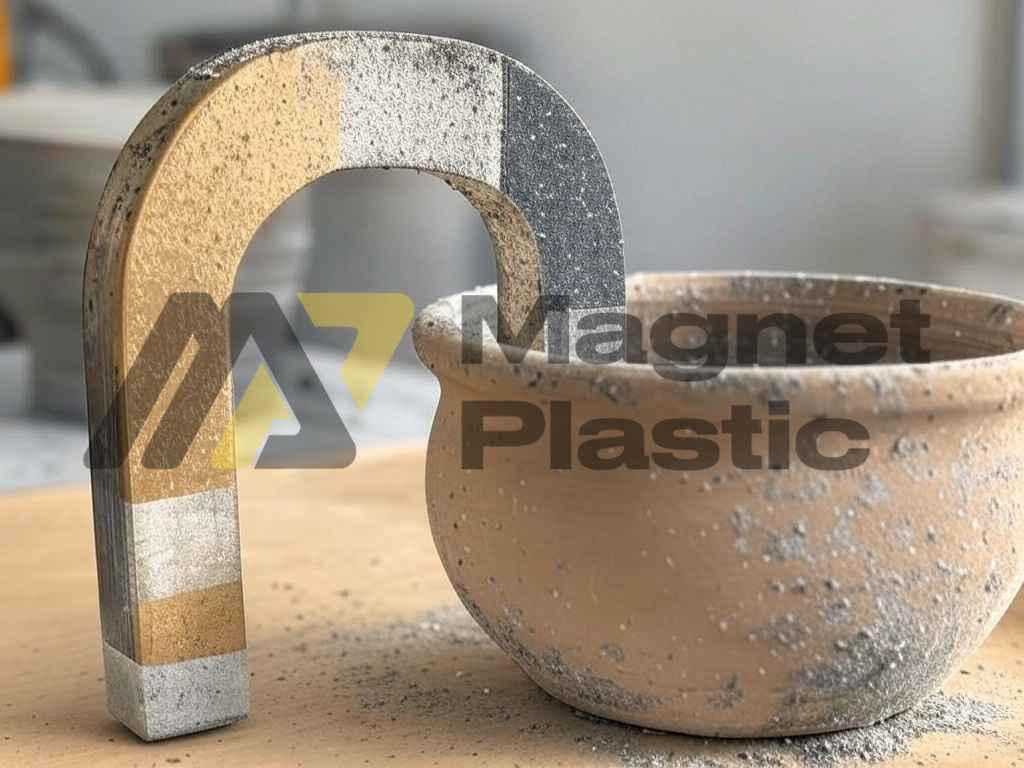The Importance of Magnets in the Ceramic Industry
The ceramic industry faces numerous challenges in ensuring the quality of its products, and one of the most recurrent problems is contamination by iron and rust particles. These impurities can cause visible defects in the finished products, such as “black spots” in the glaze and on the surface of the material, thus affecting its aesthetics and functionality. In addition, the presence of unwanted metals can damage machinery, causing downtime, production delays and costly repair expenses. To avoid these problems, magnets play a fundamental role in removing metal contaminants, ensuring a more efficient and safer production process.
The Role of Magnets in the Ceramic Industry
Ceramic products must be completely free of metals to meet the quality standards required in the market. To achieve this, various magnetic separation systems are used that prevent the appearance of rust particles in the glaze and in the structure of the ceramic. These systems ensure the purity of the materials used and prevent possible damage to the machinery.
Magnets provide a reliable solution for the removal of metallic impurities. For this purpose, strong magnetic filters designed specifically for the ceramic industry are used. One of the key features of these devices is that they allow easy removal of captured metallic particles, facilitating maintenance and ensuring efficient operation. Magnetic separation equipment is easy to clean, safe and reliable, contributing to the optimization of the production process.
Benefits of Magnetic Systems in Ceramic Production
By selecting the right magnetic system for each application, automatic and uninterrupted cleaning of the production line can be achieved, resulting in greater efficiency and less material loss. Specialized companies such as Magnetplastic offer a wide variety of magnetic separators designed to remove metallic particles at different stages of the ceramic process. These include:
Magnetic drum separators: Ideal for removing fine magnetic metal contamination of only a few microns in minerals, guaranteeing an iron-free finished product.
Magnetic filters and filter bars: Used to remove metal particles from liquids, sludge and dry powders.
Broadband magnetic separators: Implemented at strategic points in the process to remove large metal particles present in raw materials.
In addition, in grinding and milling processes, as well as at transfer points, magnets and magnetic systems protect facilities from extreme damage, avoiding unexpected stops and costly repairs.
Risks of Metal Contamination in the Ceramic Industry
The presence of metal particles in ceramic materials can generate a series of serious problems, including:
Damage to processing machinery due to the presence of unwanted metals.
Foreign bodies in the final product, affecting its quality and appearance.
Rejection of contaminated products, which negatively impacts profitability.
Claims for defects in products, generating economic losses and damaging the company’s reputation.
Discoloration of the final product, reducing its value in the market.
Solutions with Magnets in the Ceramic Industry
To avoid the problems mentioned above, it is recommended to implement magnets at various key points in the production process:
Use of magnets when unloading bulk loads to remove metal particles in the raw material.
Application of magnets at the entrance of the processing plant, storage and silos, ensuring a flow of materials free of contaminants.
Use of magnets as final cleaning and verification of the product before packaging and shipping, guaranteeing the delivery of products without impurities.
Conclusion
Magnets play an essential role in the ceramic industry, providing effective solutions for the removal of metal contaminants and ensuring product quality. Selecting the right magnetic system allows optimizing production, reducing downtime and minimizing repair costs. Thanks to specialized companies such as Magnetplastic, ceramic manufacturers can access innovative technologies in magnetic separation, guaranteeing more efficient processes and high-quality final products.
